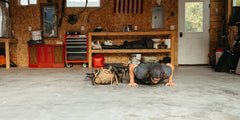

Taking on the wild requires undeniable grit. Every moment tests everything about you: your stamina, endurance, survival knowledge, nutritional needs, and your mental strength.
But when the weather turns or the trail disappears, it’s your mental game that will see you through. Truly, it's your unsung hero for staying level-headed in a crisis, making smarter choices when tired, and pushing past the urge to quit.
Developing mental strength isn't easy. But, with enough sweat, determination, and consistency, you can become as raw, real, and relentless as your surroundings.
And we should know - since the beginning, we've worked tirelessly to strengthen our toughness. This chase continues to inspire and shape everything we do at MTNTOUGH - we specializing in mental and physical training for mountain athletes, backcountry hunters, multi-day hikers, and more.
In this article, we're going to show you how three practical exercises can unlock a body and mind. But first, let's top-line the MTNTOUGH approach to building resilience.

The Fundamental Approach to Building Mental Strength
Some people enter this world as tough as nails. They're the exception to the rule.
For the rest of us, toughness is an achievement, not a birthright. It's nuanced, but this minor difference makes all the difference - an achievement requires work whereas birthright is given.
Miles deep in the mountains, mental toughness is your Northstar. Out there, the physical toll is only matched by the mental grind. You'll need muscle and stamina to handle the environment and the mindset to handle yourself.
Make no mistake, your toughness determines whether you conquer the peak or turn back. It's what keeps you moving when your body screams to stop, turning challenges into victories and setbacks into lessons. So, where do you start?

We begin mental toughness training is viewed as two tracks: education and application. MTNTOUGH was born from a position of earning toughness through knowledge and hard work, and that's the approach we take when training others.
Understand Your Toughness
Start with the basics. Go back to things you may believe you already know, like the meaning of the word 'resilience.' It might sound like a waste of time, but it's extremely helpful since resilience is so widely misunderstood.
Toughness goes by many other names (grit, resilience, mental strength, etc.), and while most people get the general idea, few can clearly define it let alone separate myth from fact. And misinformation swirls toughness like vulture - for instance, here are two facts that might surprise you:
Fact: Mental toughness is a singular concept; it isn't multidimensional. It's solely a measure of focus under stress. That's it - a single variable.
Fact: Mental toughness is not a stable trait - it changes with time as well as situation. People have varying degrees of toughness that can increase or decrease over short and long periods of time, depending on effort and setting.
As a fluid state, anyone can become tougher with the right approach. And since setting is one of the variables affecting one's toughness, if you find yourself stomping through in the most remote corners of the wilderness, you'll want to shape your situational toughness for the setting.

That's why MTNTOUGH includes educational series dedicated to how you think; bring your mind and notebook, no gym or equipment needed. If you want to toughen up mentally, let MTNTOUGH’s MTN MINDSET 2.0 be your guide and mental forge. In MTN MINDSET 2.0, you'll learn the language of toughness so you can speak it with more command.
This program drills into you the ability to think clearly under pressure, manage stress, and keep pushing when things get tough. It’s about transforming your mindset to dominate in the wild.
Test Your Toughness
Miles deep in the mountains, mental toughness is your Northstar. Out there, the physical toll is only matched by the mental grind. You'll need muscle and stamina to handle the environment and the mindset to handle yourself.
From lecture to lab, it's time to put your education to the test. With greater awareness on the mind, you'll simulate a stress test that mimics what you might face in the outdoors by completing MTNTOUGH+ workouts, programs, and series.
This is the closest thing to mastering toughness in the field. Here are two MTNTOUGH+ that bring this idea to life
1. Backcountry Hunter Training: The MTNTOUGH 'Backcountry Hunter' Series is a no-nonsense training program designed for hunters. It's about toughening up for the wild, focusing on long-term physical and mental fitness. The series packs a punch with diverse training phases: Neural Recruitment, Strength and Power, Conditioning, Muscular Endurance, Cardiovascular Training, and In-Season Maintenance. It's a series of programs all about creating real, lasting fitness, arming hunters with the stamina, strength, agility, and determination to take on the rugged demands of backcountry hunting.
2. Heavy Pack Training:
This form of training is another aspect of physical resilience. It's effective in enhancing strength, endurance, and mental toughness. Heavy pack training involves exercises that boost metabolic efficiency and fortify muscular endurance, preparing individuals for physically demanding activities like backcountry hunting.

Fundamentals of Resilience: Lesson and Practice
Combing educational coursework with intense physical training in MTNTOUGH+ programs, is a one-two punch for turning resilience information into knowledge that moves the needle on your path to becoming tougher. In a MTNTOUGH+ workout, you're building your body and mind.
Make no mistake, your toughness determines whether you conquer the peak or turn back. It's what keeps you moving when your body screams to stop. Mental grit turns challenges into victories and setbacks into lessons. It will transform your experience from surviving the outdoors to owning it.
3 Exercises That Build Mental Strength
Tackling the intensity of nature is a test of your comfort with being uncomfortable. And that’s the lynchpin to building resilience; you’re not changing the conditions around you as much as you're changing the reaction to the conditions.
While some online actors will tell you that mental toughness can be built from your couch, we’d remind you that things sounding too good to be true typically are. For every element of education, you need equal parts application. That means putting your knowledge and experience through the ringer to see where you stand.
Building mental strength requires maniacal dedication and intent. Full stop.
While there's no silver bullet to toughness, if we could travel back in time before our journey to greater toughness started, we'd want to have known the following three concepts:
- Seek Discomfort and Stay There:
Step up and face the unknown. Challenge yourself with something that pushes your limits, it could be anything, from the physical discomfort of tackling a tougher workout to the social discomfort of leading a high-pressure presentation at work.
The context doesn't matter as much as the feelings of consequence. If it makes it grimace, it's probably a good exercise for you.

With enough mental reps in the lab, when you head into the wild you might find yourself hunting in new, uncharted areas, climbing terrain that used to be off-limits, or hitting trails you never thought possible. In situations where your toughens matters more, like a serious injury in the backcountry, you'll be able to manage the issue with greater focus and less panic; ultimately a greater shot at successful evacuation.
Practiced regularly, this exercise will give you the strength to deal with stress and the flexibility to change with ease. Practiced in safer settings, you can prove your toughness and ability to adapt in the wild before you ever get there.
- Mindfulness and Meditation:
While the first exercise helps you deal with the reality of stress through exposure, this exercise will teach you to tune distractions out to maintain focus. You'll learn how to adapt to a desired state with external influences.
Mindfulness and meditation are extremely simple concepts to understand, this lowers the barrier of entry.
To get started, your mindfulness or meditation on-ramp could look like this:
- Carve out 5 minutes a day to yourself, away from any devices and distractions.
- Focus on deep breathing
- Let thoughts come and go without consequence or judgement
- Try to stay neutral and bring your attention back to your breathing
Over time, you'll be able to firmly stay in the present on demand.
Although it's easy to get started with mindfulness training, mastery is a matter of commitment and consistency. With enough devotion you can become more present. You'll have a calmer mind and increased focus in the face of adversity. Sure it's challenging, but any path to toughness will be.
- Practice Daily Gratitude:
This is about making it a point every day to spot and value the good things in life to build a more positive outlook. Take time every day to recognize the good stuff, whether it's a favorite meal, a funny moment during the day, or a dependable person in your life.

It's straightforward but impactful – take note of what's excellent in your life.
When you're hunting or hiking, and far from your daily routine, there's a lot to be thankful for. It might be a successful hunt, an incredible view from the peak, or the serene quiet of nature. Pay attention to and value these moments.
Where it concerns toughness though, faced with hardship, you'll still be able to find something to be grateful for. This habit keeps your morale up and your focus sharp instead of distracted by hopelessness or consumed by rumination.
To practice daily gratitude:
- Dedicate a moment in your day to reflection - either the beginning or end of the day
- Identify three or more moments throughout that day that made you thankful
- Write them out on paper and make each as short or long as you like
The process of writing them down will increase your ability to recall and value the moments. They don't need to be long paragraphs or prose; they could be 3-5 words that give you enough idea of what the moment was about. Daily practice fosters a positive mindset that can power you through the good and bad in life - hope is a powerful driver for toughness.
Cultivating A Tougher Mindset
Commit to any one of the three exercises above and you’re pouring the foundation for long-lasting mental resilience. Each one targets a specific aspect of mental toughness, from endurance to focus. They’re designed to be incorporated into your daily regimen, reinforcing mental resilience in practical ways.
If you find yourself in locations that others detour to avoid, then physical strength will only get you so far. Hunting, hiking, or any other rugged activity requires elite mental muscle.

Mental toughness can transform your time outdoors into life-defining experiences.
For hunters, resilience is tied to every element of hunting success. Your ability to stay patient, sharp, precise, etc - this is toughness in action, keeping you cool when it counts and staying laser-focused through the wait.
Any hiker will tell you that physical endurance pales in comparison to mental stamina to complete a multi-day hike. When the trail gets rough, your mind will typically give out long before your body does. Your toughness is what keeps you moving. Stepping over obstacles, staying positive, and tackling challenges head-on.
It’s a daily grind dedicated to sharpening both body and mind for the unpredictable. This isn't a path for casual commitments; it's the way of the elite mountain athlete, where every new day is an opportunity to increase resilience.
So whatever drives you to push beyond the comforts of a well-worn trail, with the right mindset and ongoing training, you can reach unmatched levels of mental toughness.




